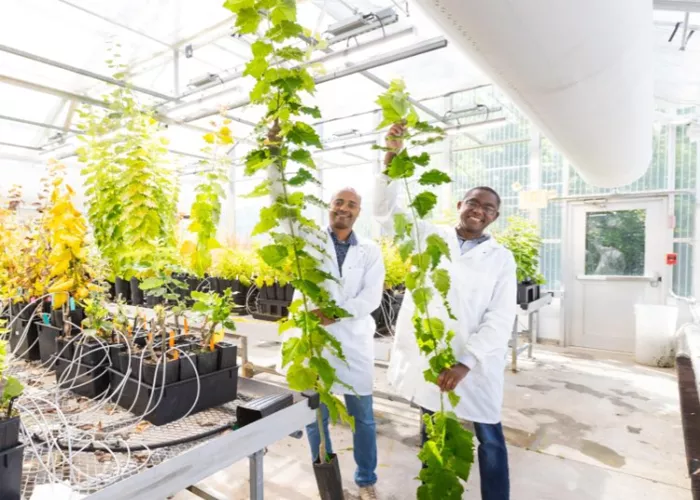A groundbreaking discovery by scientists has revealed a gene in poplar trees that can significantly enhance photosynthesis and plant growth, with the potential to increase agricultural yields and bioenergy production. This gene, named “Booster,” can improve growth by up to 200% under controlled conditions and by about 30% in real-world field conditions.
The Role of Booster in Plant Growth
The research, conducted by teams at the Oak Ridge National Laboratory (ORNL) and the University of Illinois Urbana-Champaign, identifies Booster as a gene that increases the height of poplar trees, a key species used in biofuel production. The gene also boosted the growth of Arabidopsis (thale cress), suggesting that it could be applied to other crops for increased yields.
Booster is a chimeric gene, meaning it is made up of genetic material from three different sources: a bacteria found in poplar roots, an ant that farms a fungus infecting poplar, and a protein called Rubisco. Rubisco is essential for photosynthesis, helping plants capture carbon dioxide from the atmosphere. Increasing the amount of Rubisco could lead to greater crop yields and more effective CO2 absorption.
Significant Growth Results
In controlled greenhouse conditions, poplar trees with higher Booster expression grew up to 200% taller. The gene increased the trees’ Rubisco content by 62% and boosted leaf CO2 uptake by 25%. In field trials, the trees grew 37% taller and saw an 88% increase in biomass per plant.
The same gene was inserted into Arabidopsis, where it led to a 50% increase in seed production, demonstrating the broader agricultural potential of Booster.
A Step Toward Sustainable Bioenergy
Poplar and Arabidopsis are C3 plants, a category that includes important food crops like soybeans, rice, and wheat. The discovery of Booster could potentially increase bioenergy crop yields without requiring more resources such as land, water, or fertilizer. This could be especially valuable for producing biofuels and bioproducts, which are crucial for sectors like aviation that are difficult to electrify.
“Growing resilient, high-yield bioenergy crops on land unsuitable for traditional farming could meet growing demands for biofuels while creating jobs and supporting the bioeconomy,” said Jerry Tuskan, CBI director at ORNL.
A Promising Agricultural Future
Stephen Long, a professor at the University of Illinois, noted that while further research is needed to confirm the results across different plants, the success in poplar and Arabidopsis suggests that Booster could be applied to a wide range of crops.
The next phase of the research will involve field trials to test the effects of Booster on various crops under different growing conditions, providing insights into its long-term potential.
Strategic Collaboration and Cutting-Edge Research
The discovery is the result of a partnership between two Department of Energy centers—ORNL’s Center for Bioenergy Innovation (CBI) and the University of Illinois’ Center for Advanced Bioenergy and Bioproducts Innovation (CABBI). The research was supported by the U.S. Department of Energy Office of Science, and its findings were published in Developmental Cell.
The ORNL-led team has been researching poplar trees for years, aiming to improve bioenergy feedstocks. They used a genome-wide association study to identify genes linked to key traits like growth and photosynthesis efficiency. After screening poplar samples, they pinpointed Booster as a key factor in improving plant productivity.
Looking Ahead
The discovery of the Booster gene challenges the assumption that photosynthesis is difficult to improve, showing that evolutionary changes can enhance plant productivity. Researchers hope to expand their studies to include a broader range of crops and growing conditions in the future.
The full study is titled “An orphan gene BOOSTER enhances photosynthetic efficiency and plant productivity” and was published on December 3, 2024. The research team includes experts from ORNL, the University of Illinois, and other institutions across the U.S.
Related topics:
- California Native Plants: Vibrant Alternatives to Traditional Holiday Trees
- Christmas Cactus’s Deadliest Enemy Is Easy to Avoid – And It’s Not Pruning!
- From Seedlings to Stardom: How Christopher Griffin Became the ‘Plant Kween’


